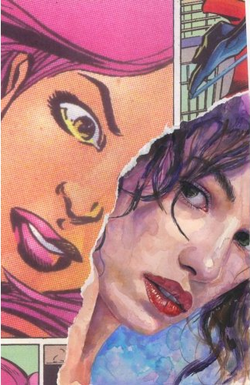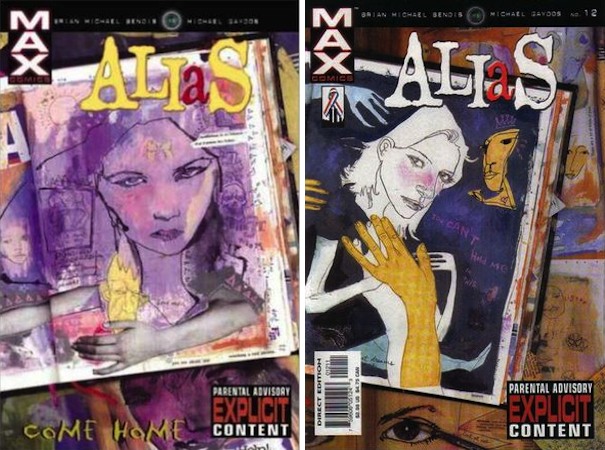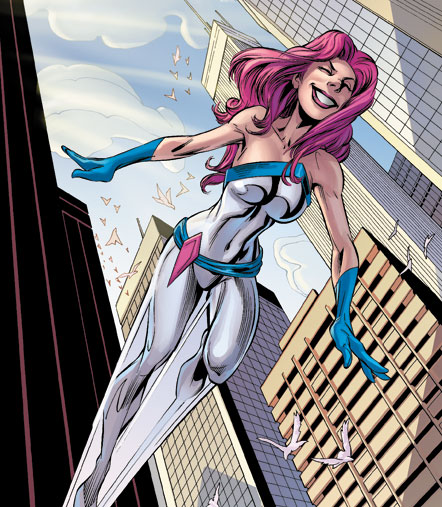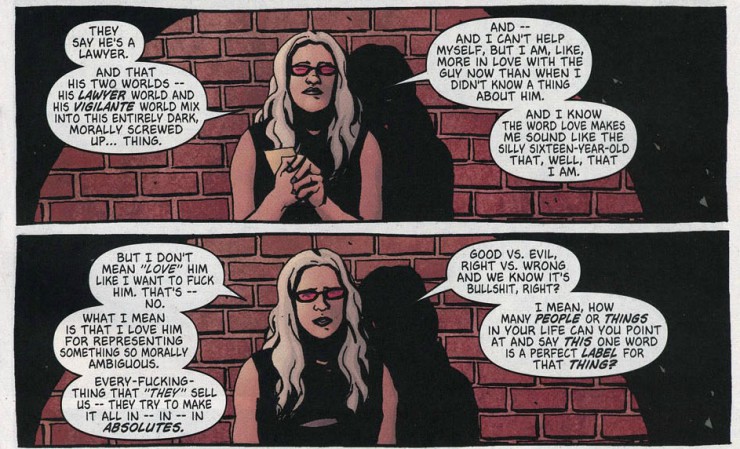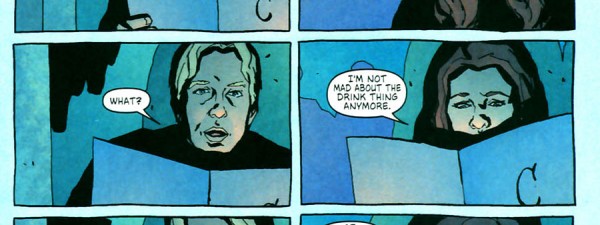Welcome back to the Alias re-read! Previously in Alias, we met Jessica Jones, former third-rate superhero, now private detective.
Last time, we followed Jessica as she saved Captain America from a potential sex scandal/political conspiracy, was taken for a ride by a dodgy Rick Jones impersonator (seriously, if you’re going to impersonate someone famous, why would you pick Rick Jones?), repaired her rocky friendship with Carol Danvers AKA Ms Marvel, and had a one night stand with Luke Cage before discovering he’s a total cape chaser.
Note: Don’t fret about the absence of Issue 10—it was included in the third trade edition, not the second, for reasons that will become clear next week.
ALIAS: Come Home (#11-15)
Issue #11
JESSICA JONES:
Nothing like this has ever happened here in this town, has it?
Last week, I mentioned the photo/collage style artwork by David Mack which makes the Alias covers so distinctive, and tells you up front that whatever you’re reading, it’s not a superhero comic.
This next story arc factors that art style into the narrative.
This is a small town mystery, with Jessica driving to Lago, NY on the first page. Local girl Rebecca Cross is missing, we learn from a billboard, and also from the town newspaper which announces Jessica’s impending arrival. Jessica is furious at being outed via press release—we get a whole double page spread of her attempting to explain to her client, the aunt of the missing girl, why “private” is the operative adjective in “private investigator.”
That isn’t the only weird thing about this case. Mrs Cross has separated from her husband, on the grounds that she doesn’t trust him around young girls, and she has suspicions he was inappropriate with their (missing) daughter.
When Jess calls on Mr Cross, he calls her a bitch straight off, and swears up and down (emphasis on the swearing) that he’s innocent.
The most interesting thing Jessica finds in Rebecca’s room is a collection of collage books—they strike a chord with her because she used to make similar art as an angry teenager, and she thinks this might offer some insight into the girl’s state of mind.
There’s something odd about the sheriff—he is flirting awkwardly with Jessica, and he’s intent on following her during the investigation. Is he creepy or cute? I honestly can’t tell.
At the school, Jessica finds a pic of Daredevil taped inside Rebecca’s locker, but it’s the outside that’s more interesting—the words DIE were recently painted and resprayed over. A student informs her that Rebecca was a mutant.
Issue #12
FREDDY:
It’s not illegal to try to bang a mutant, is it?
Jessica investigates Rebecca’s so-called mutation, which most people took at face value—and why would a teenage girl claim she was a mutant if it wasn’t true? The rumour started with Freddy, a douchebro who tried to hit on Rebecca—she told him her mutant power would totally kill him if they had sex. (Ahh, so that’s one reason to claim to be a mutant, right there.)
Jessica chases off Patrice, the local news reporter, pointing out how counter productive it would be to give her regular updates on the case. Patrice pushes for her to come to church on Sunday.
The collage art from the covers bleeds into the main story, with images of Rebecca’s collages (which have superhero themes including images of Daredevil and the Punisher) overlaid by Jessica’s reactions to that art. Her creep/flirtation with the hot sheriff continues as she leafs through the books in the local bar, but they are interrupted by the rageswearing of Rebecca’s angry father, Mr Cross.
The sheriff talks Cross down with reason and patience, which raises his hotness factor in Jessica’s eyes. She ends up making out drunkenly with him against the cop car, as you do.
Another clever use of artwork contrasts gives us two pages of dream sequence depicting Jessica as the bright, happy pink-haired superhero Jewel, drawn by Mark Bagley. The use of Bagley’s art to mark Jessica’s cheery superhero past versus her Michael Gaydos-drawn noir present, will be a strong feature throughout the whole run of Alias, and with an emotional payoff in later storylines.
Here, the scene marks the space between Jessica propositioning the hot sheriff and then blacking out, and Jessica waking up in the drunk tank at the police station. The dream sequence expresses the happy memories of Jessica-as-Jewel playing in the skies with a very traditionally-drawn Thor, but inserts a couple of judgy images of angsty teen Rebecca into the mix.
Speaking of judgy, the sheriff is dark on Jessica the morning after—it’s implied they had rough sex that was “a bit much” for him, and mirrors what we saw of her with Luke Cage. Jessica doesn’t just want sexual gratification in encounters like these—she wants to feel used.
Remembering Patrice’s warning, Jessica checks out the church a day early, only to hear the local priest practicing his sermon, a treatise on mutants as abominations.
Issue #13
PATRICE:
So, I take it you already went and visited our first unity church of hypocrisy and racism.
Jessica discusses Rebecca with the priest, but can’t bring herself to skate over what she heard for the sake of politeness. They argue about his using the pulpit to preach anti-mutant hate—and Jessica lets slip that this might have something to do with Rebecca Cross, who self-identified as a mutant.
The priest is shocked.
Jessica has a meltdown in the diner bathroom, only to have to deal with her ‘night before and morning after’ all over again when the sheriff corners her, feeling bad about his behaviour.
All in all, this is the worst possible time for charming Scottie “Ant-Man” Lang to call up, suggesting a date. Jessica doesn’t manage to completely scare him off, but she has work to do.
Patrice the reporter isn’t quite the idiot Jessica thought she was, and the two of them commiserate about the racism and anti-mutant sentiment that’s rife in this small town. I really like that Patrice has turned out to be an ally, despite having very different priorities to Jessica—for all that Jessica is terrible with people generally, she does work well with other women, and is often given the opportunity to do so. She also is willing to admit when she’s wrong about someone… most of the time.
Patrice is certain that Rebecca wasn’t a mutant and that it was all the other kids spreading dangerous gossip—Jessica isn’t so sure that the source of the rumour wasn’t Rebecca herself. Either way, Patrice’s theory is that that Rebecca was seen as a viable target of rape and/or murder because people thought she was a mutant.
When Jessica goes back to have a more intelligible discussion with Mr Cross now they’ve both sobered up, she finds him dead in his armchair, his throat slashed. Later, as the ambulance and police remove Cross’s body, Jessica spots an urban teen who seems out of place in this small town, and demands to be taken to Rebecca.
Running in the background of the scenes of Jessica discovering the body is the news story of the day—the public outing of Matt Murdock, attorney-at-law as the masked vigilante Daredevil. Brian Michael Bendis was writing Daredevil at the same time as Alias, which allowed him to integrate Matt Murdock’s story with that of Jessica—he’s pretty much the only character with an active book of his own who takes an important, ongoing role in Alias.
(I’m really intrigued to know how much this integration will feature in the Netflix series, as it seems pretty likely that their choice of protagonists: Daredevil, Jessica Jones, Luke Cage and Iron Fist, were at least partly influenced by their connections as established here in this comic)
Here, the news story about Matt/Daredevil being doxxed is presented as background noise and/or poignant commentary but also flags a major Marvel Universe event which will be significant to future issues of Alias.
RADIO COMMENTATOR:
Why do we as a society have this compulsive need to hurt those who would protect us?
Issue #14
Focus on Rebecca: silver hair, red-lensed sunglasses, speaking passionately about the outing of Matt Murdock as the vigilante Daredevil before launching into her slam poetry performance in a smoky club. So much crime drama, on television and in fiction, revolves around missing girls: victims of rape and abuse and murder. It feels quite subversive to see Rebecca speak, and to realise that she was alive all along.
Jessica isn’t surprised, and we shouldn’t be either. During the entire case, Jessica has paid attention to Rebecca, and her motivations, rather than the question of who might have taken her and why.
Turns out, Rebecca was here in the city, embracing the freedom of being a bohemian poet with a hot girlfriend and a bouncer willing to protect her. (Sadly he is not able to protect himself from being kicked in the nuts by a cranky detective with super powers)
In an inversion of the usual ‘client talks while Jessica listens’ strip panels, we watch Rebecca pouring out her tale of woe in the car while Jessica drives her home. The sixteen-year-old is furious at the world, at racism and anti-mutant sentiment, at the creative confinement of living in a small town, and she pours it all out over several pages—all the reasons why she left, and why she’ll leave again the second she gets a chance.
They are interrupted briefly by a call to Jessica from Matt Murdock of all people, making an appointment for the next storyline, which temporarily shuts Rebecca up, because he’s her hero. She is silenced a second time when she sees the REBECCA, PLEASE COME HOME. WE LOVE YOU billboard on re-entering her town.
Crucially, Jess hasn’t told Rebecca that her father is dead (in her defence, she wasn’t 100% certain Rebecca wasn’t the murderer). They drive back into unexpected chaos, with headlights blazing and Rebecca’s aunt under arrest (by the sheriff) for the murder of her sister’s husband.
Rebecca’s mother lunges at Rebecca out of the crowd, slaps the glasses off her face, and calls her a whore at the top of her voice.
While the sheriff handles the arrest, Jessica takes off after Rebecca, and has an entirely unsatisfactory Deep and Meaningful with her.
Case is closed, the aunt is guilty (she murdered Cross because she believed her sister’s theory that he had abused and possibly abducted Rebecca), and everyone is unhappy. At least Rebecca’s girlfriend came to rescue her from this horrible town! Back to bohemia for them. Also, the sheriff pressured Rebecca’s mother to write a check for Jessica, so she got paid for once. Woo?
I find it really interesting how often Jessica’s private detective antics means that she gets to the heart of the story—the people and their complexities—but the actual crimes are often solved or sorted by official law enforcement, as when SHIELD took on the political conspiracy. It’s pretty great, actually, as a lot of private detective narratives present the police as corrupt or useless; it’s more interesting to see how the role of private detective works in the face of law enforcement competence.
Anyway, the sheriff is good at his job, but totally not boyfriend material. On the drive home, Jessica receives another call from Scott Lang, and this time gives him a chance to make a connection with her.
Issue #15
JESSICA JONES: Hey, you think it’s true?
LUKE CAGE: What?
JESSICA JONES: The shit with Matt being Daredevil.
LUKE CAGE: Oh yeah.
JESSICA JONES: Huh. So then he just heard this whole conversation we just had.
Jessica is working a new job—as a bodyguard for Matt Murdock alongside legendary Hero For Hire Luke Cage. This mostly means a lot of standing around, and maybe not recognising the Black Widow when she turns up with the wrong coloured hair.
Matt Murdock maintains publicly that he is not the vigilante Daredevil, despite being recently outed in the press. To keep up appearances he needs super-powered bodyguards to protect him from Daredevil’s enemies.
For Jessica, standing next to Luke Cage all day is super awkward until he presses the point that their one night together was consensual. Unless she has designs on being his girlfriend, Jessica really doesn’t have a right to be mad about who else he sleeps with.
She raises the cape chaser issue that Carol alerted her to, only to have Luke laugh in her face. Of course he sleeps with a lot of superheroes. HE’S A SUPERHERO. If he was a lawyer, he’d probably hook up with a lot of lawyers.
Yeah, fair point.
Jessica finally gets a chance to say thanks to Luke for sending Matt to her when she was being questioned by the police that time. They cement their restored friendship with a smutty Iron Fist joke, as you do.
The colour palette shifts from purple to aqua as we move from the day job to Jessica’s first date with Scott Lang. It gets super awkward when Scott interrupts Jess’s drink order to suggest—in front of the waitress—that they have an alcohol-free night.
Jessica is stunned by the presumption, and it doesn’t help when Scott explains that Carol told him she (Jess) has a habit of drinking and then getting mad at herself afterwards.
It’s such an outrageous piece of boundary-stepping that Jessica actually relaxes and starts acting a lot more like herself: sassing him, asking intrusive questions about his criminal past and his divorce, and so on.
At one point Scott wonders why Carol would have set them up in the first place and Jessica teases that it’s because he matches Carol’s own parameters for a dateable dude. It’s mostly about the shoulders. And the job description.
SCOTT: Then why didn’t she ask me out for herself?
JESSICA: Well you been to prison.
SCOTT: Oh, come on…
They bond, impossibly, over how awkward dating is and how ridiculous this situation is. When, as often happens in New York, Spider-Man and the Human Torch flit past in deadly battle with Doctor Octopus, neither Scott nor Jessica turn a hair. He hasn’t got his gear, and she doesn’t do that any more. So they leave it to the professionals.
Tansy Rayner Roberts is a Marvel Comics tragic, and a Hugo Award winning blogger and podcaster. Tansy’s latest piece of published short fiction is“Fake Geek Girl” at the Review of Australian Fiction, and she writes comics reviews on her own blog. You can find TansyRR on Twitter & Tumblr, sign up for her Author Newsletter, and listen to her on Galactic Suburbia or the Verity! podcast.










